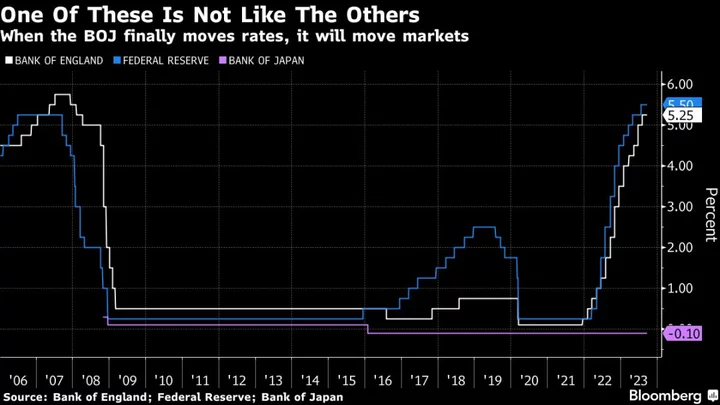Equity markets in Asia are poised to open lower after US stocks suffered the biggest slump in six months.
Futures for indexes in Japan, Hong Kong and Australia all pointed to declines. The S&P 500 slid 1.6% on Thursday, the most since March, and all major US equity benchmarks slipped below their 100-day moving averages.
The yen was little changed after Japan inflation data exceeded estimates, casting doubt on the Bank of Japan’s expectation that price pressures will peak in 2023 and fall back toward its 2% target in coming years. The central bank is due to deliver a policy decision Friday.
Japan’s currency rallied Thursday on haven bids in US trading, after weakening to a fresh 10-month low near the 150 level earlier in the week. While policymakers are widely forecast to keep monetary stimulus unchanged Friday, remarks that Governor Kazuo Ueda might make on negative rates or correlations between currencies and policy will be closely watched.
Australian and New Zealand bonds dropped Friday, echoing action in the Treasuries market on Thursday. Treasury 10-year yields climbed and the dollar rallied as the latest reading on the labor market reinforced the case for the Federal Reserve’s higher-for-longer stance.
Applications for US unemployment benefits fell to the lowest level since January last week, indicating a healthy labor market that continues to support the economy. The Fed on Wednesday held its target range, while updated quarterly projections showed most officials favored another rate hike in 2023.
“On net, it was a solid read from one of the closest to ‘real time’ employment data investors are afforded,” said Ian Lyngen at BMO Capital Markets. “It also marginally increases the chances the Fed hikes in November and certainly reinforces the Fed’s messaging regarding avoiding cuts as long as possible in 2024.”
Read More: Traders on Intervention Watch as Yen Hovers Near 150 to Dollar
Chevron Corp. and labor unions reached an agreement to end strikes at natural gas facilities in Australia. The threat of strike action had roiled global markets for the fuel.
The pound fell after the Bank of England kept rates unchanged for the first time in almost two years. The MSCI Emerging Markets Index of stocks erased its 2023 advance. Oil steadied as the broad, risk-off sentiment eroded gains driven by a Russian ban on gasoline and diesel exports, and is set for its first weekly drop this month.
Unprecedented Loss
Bond investors’ pain isn’t over yet, even though the Fed is done raising interest rates, said Bill Gross, the former chief investment officer of Pacific Investment Management Co.
In an investment outlook, Gross said bond markets are headed for an unprecedented third year of losses, because of sticky inflation and widening deficits, a result of government fiscal spending he equates with throwing “money out of a helicopter.”
Former Fed Bank of St. Louis President James Bullard said the central bank may need to raise rates further and hold them higher to guard against the risk of a reacceleration of inflation. Meantime, Former Treasury Secretary Lawrence Summers said policymakers are too optimistic with their latest set of economic projections.
Key events this week:
- China’s Bund Summit, Friday
- Bank of Japan rate decision, Friday
- Eurozone S&P Global Eurozone PMIs, Friday
- US S&P Global Manufacturing PMI, Friday
Some of the main moves in markets:
Stocks
- S&P 500 futures were little changed as of 8:47 a.m. Tokyo time. The S&P 500 fell 1.6%
- Nasdaq 100 futures were little changed. The Nasdaq 100 fell 1.8%
- Nikkei 225 futures fell 1.3%
- Hang Seng futures fell 0.5%
- S&P/ASX 200 futures fell 1.4%
Currencies
- The Bloomberg Dollar Spot Index was little changed
- The euro was unchanged at $1.0661
- The Japanese yen was little changed at 147.64 per dollar
- The offshore yuan was little changed at 7.3159 per dollar
Cryptocurrencies
- Bitcoin fell 0.1% to $26,565.72
- Ether fell 0.2% to $1,584.5
Bonds
- The yield on 10-year Treasuries advanced nine basis points to 4.49% Thursday
- Japan’s 10-year yield advanced 2.5 basis points to 0.745%
- Australia’s 10-year yield advanced five basis points to 4.35%
Commodities
- West Texas Intermediate crude rose 0.1% to $89.75 a barrel
- Spot gold was little changed
This story was produced with the assistance of Bloomberg Automation.

